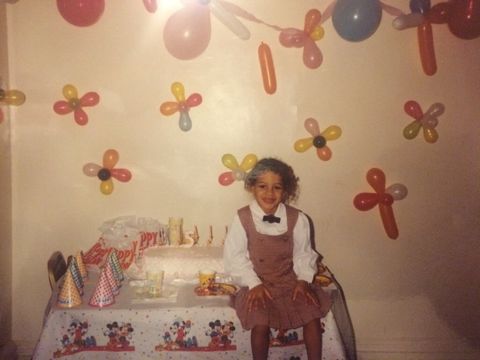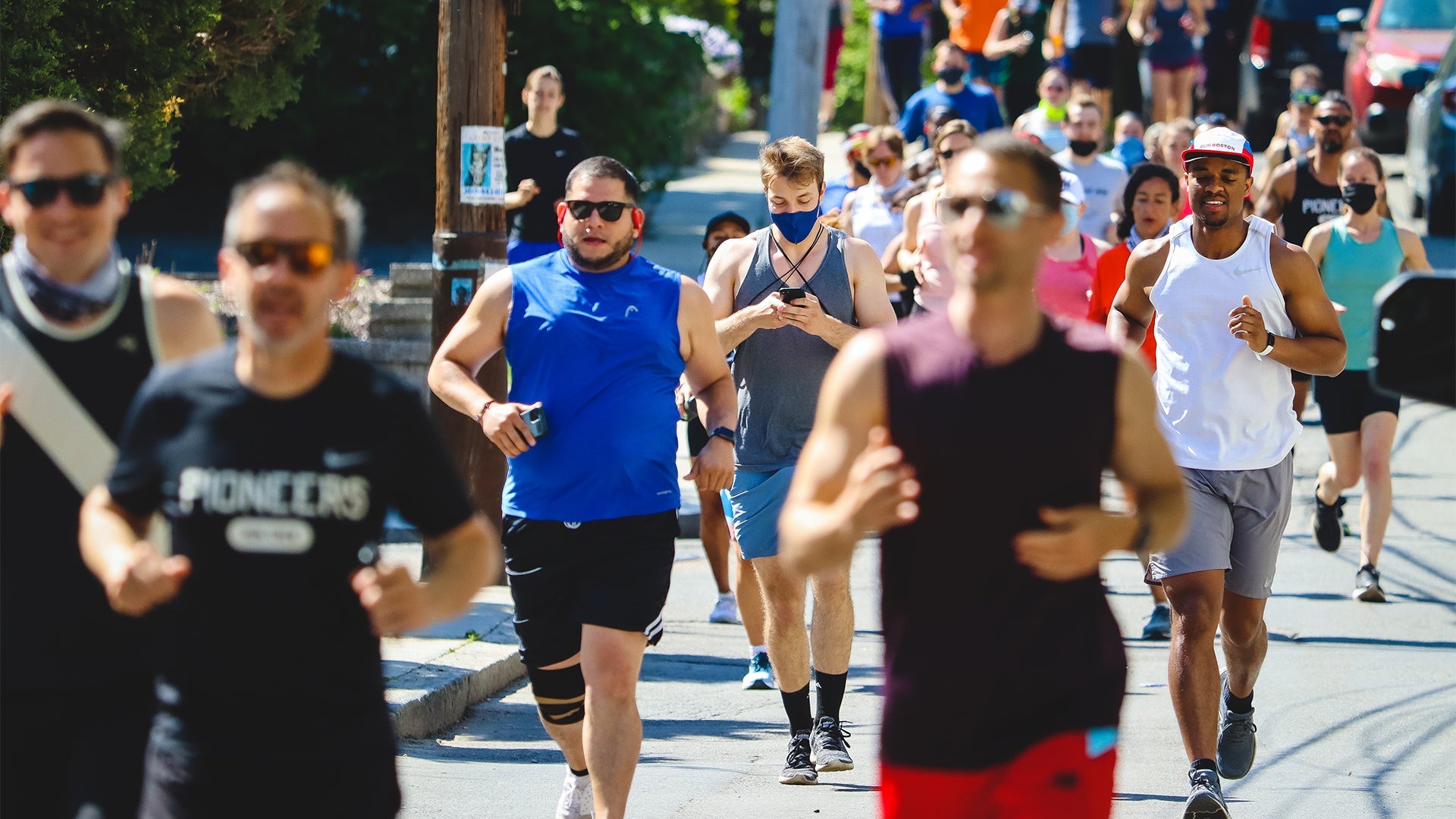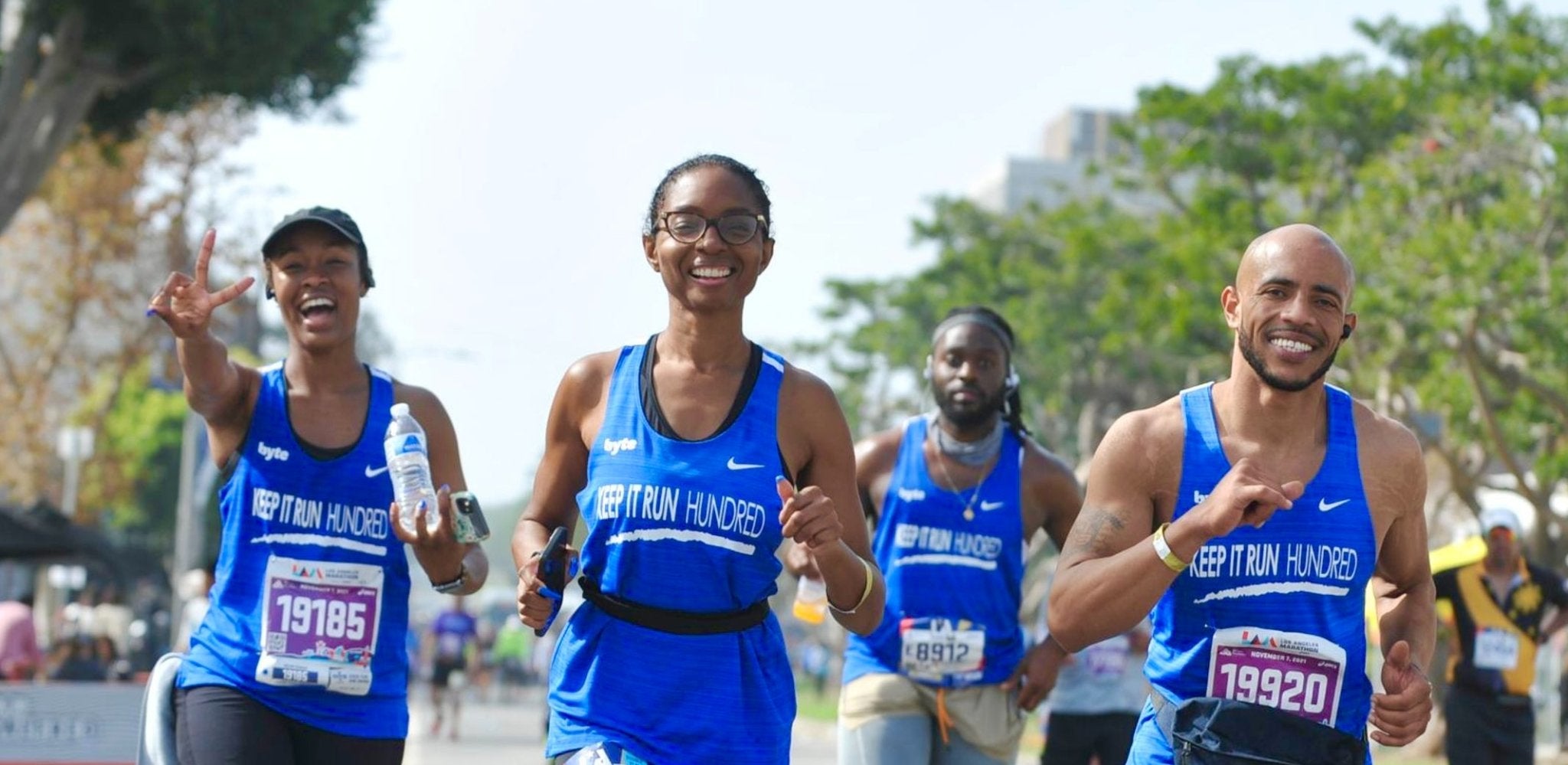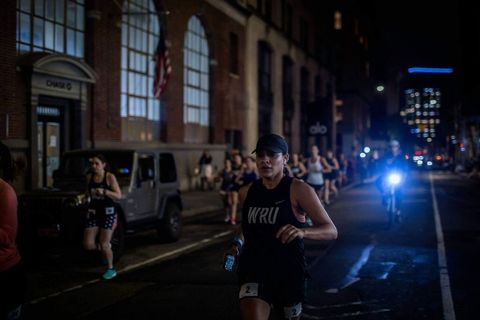Kiki Mejia is no stranger to hard work, determination and loyalty. And in New York’s We Run Uptown run crew - she found a special group of people with the exact same outlook, goals and mentality.
 |
 |
| Courtesy Chuck Marcus |
"I talk to myself too much sometimes, I think," muses Kiki, who joins us from her car in her home city of Uptown New York City.
"I tell myself I should be faster, I should have done more marathons. And then I have to take a step back and say 'take it easy girl, you've got a lot on your plate'."
While she may have a lot on her plate, Kiki certainly never had anything handed to her on a plate. Born in the Dominican Republic, Kiki moved to New York before her fifth birthday, unable to speak a word of English. She's worked since she was 13 years old - and behind her warm personality is a steely determination.
But what does an independent and highly driven runner like Kiki get from being part of a running crew? You could be forgiven for thinking that the impact is minimal - when in fact, the opposite is true.
"It's everything," says Kiki. "It's a beautiful thing - I recommend it to anyone and everyone."
We sat down with Kiki to find out just how big an impact her running crew has had on her, her community and future generations.
"We left everything behind… it was a whole new world"
First - there's an important question to clear up:
"My legal name is Ana," Kiki laughs. “I have no idea where 'Kiki' came from! And my mom has no idea where Kiki came from either - she just started calling me it from a young age."
Kiki was just under 5 years old when she moved to New York from the Dominican Republic. An unsettling event in itself, the move was preceded by Kiki and her older sister living apart from their parents, who traveled to the US before they did.
 |
 |
"That time was a little traumatic," recalls Kiki. "The people they [her parents] left us with weren't the best, we weren't really being taken care of the way that we should."
Things didn't get easier when they eventually joined their parents in New York. For a young girl bursting with energy, the city streets of Harlem were a far cry from the freedom and outdoor living she enjoyed in the Dominican Republic.
"I used to play with my cousins - who were all boys! The houses there [in the Dominican Republic] were so large you could play hide and seek in them," says Kiki. "Then we left everything behind, we came here, and it was a whole new world. I came from a place where you literally just wake up and go outside, to somewhere you felt trapped within four walls."
"And I came here knowing only Spanish. My mom didn't speak English either! My dad was the only one who knew English."
Her new urban home and the cold winter weather didn’t totally stop Kiki in her tracks. She rode a hand-me-down bicycle, went to the park every day that she could, and played basketball or tag with "the guys on the block."
In elementary school, she even threw herself into dance: "I got into the Dance Theatre of Harlem. I did so many things! Ballet, jazz, modern, latin music."
Later, Kiki experimented with track & field, and found a home in softball and - unusually - bowling. However, "life happened" again, forcing Kiki to change her priorities.
"Just tell your Mom I'm leaving"
"Our father walked away when I was around 12 or 13 years old," explains Kiki. "He said 'just tell your mom I’m leaving’ and was gone. Suddenly my mom, who still couldn't speak English, had to feed two daughters and keep a roof over all our heads."
To help support the family, Kiki started working at age 13. For a few years, she was able to balance school, sports and work. However, when she reached college, the additional workload and a long commute meant that Kiki faced a choice.
 Courtesy Chuck Marcus
Courtesy Chuck Marcus
"I started to fail [in my academic studies], so I really had to focus. I didn't have the option to have financial support - everything financial was on me. So was I going to work, or was I going to play sports? Well, me and my sister have always made it our business to be financially stable, so I stopped staying active and focused on my studies - and earning what I needed to."
Certainly things weren’t easy for Kiki at that time, but typically, looking back she feels more grateful than afflicted.
"I was lucky to be able to go to school and get my degree," Kiki says. "I'm grateful for it... but at the same time, I wish it was a little easier."
"Si lo quieres puedes tenerlo" / "If you want it, you can have it"
When presented with the challenges that Kiki faced, all before she even graduated from college, a lot of people would have crumpled. So where does Kiki's ability to - not only cope with upheaval and challenges - but to tackle them head-on, come from?
"My mother used to say 'Si lo quieres puedes tenerlo' - which means if you want something, you can have it,” says Kiki. “And so I just had tunnel vision when it came to trying to achieve what I wanted."
"But really," Kiki continues, "I didn't feel like I had a choice - something just clicked in me at a young age. I came to terms with things very young, and I have no idea how I did so at such a young age… maybe it's the Libra in me!".
Whatever the source of Kiki's drive and determination, it wasn't long before she turned her focus to physical activity - and the reason she fell into running specifically was incredibly simple.
"My birthday was coming up," Kiki explains. "I thought 'what's the quickest way for me to start losing weight?’ The answer was cardio.. running!"
And so Kiki developed a new morning ritual, which saw her get up at 5am and run laps around the neighborhood - in all weather and all temperatures. Quickly, running became much more to her than a way to lose weight. Kiki found the same benefits runners across the country will recognize: "You can take some time for yourself, take some time to focus on your body, and stay in shape - it's great."

Before long, Kiki - and her sister - were participating in running events to raise money for charity. By this point in time, Kiki’s father had passed away of a heart attack, and so the pair ran and raised money for the American Heart Association. While the primary aim was keeping fit and raising money - Kiki’s competitive spirit still quickly came to the fore.
"I would run in those little events and I’d want to beat everyone," she laughs. "I want to beat you, and you, and you! Those events were a turning point for me, where I started to really focus on my running and improving my performance."
"Had it not been for the community, I’d never have run a marathon."
Kiki may have been an experienced, enthusiastic runner - but it wasn't until she joined a local running crew that she developed ambitions to take on the biggest challenge in running.
Kiki was introduced to We Run Uptown (WRU) by her partner at the time - and immediately found a sense of belonging: "I said 'this is amazing, why didn't you bring me sooner?' The sense of community was automatic."
Her participation with the crew saw her attend the New York Marathon for the very first time as a spectator. She was instantly captivated and inspired by the efforts of the runners - and of the crowds screaming their support.
"The energy was what spoke to me when I was spectating," Kiki recalls. "The adrenaline, the drive, the sweat, the tears, the emotions - everything people were experiencing in that moment."
 |
 |
| Courtesy Keith Montero |
In 2019, Kiki ran the New York Marathon herself - with typical Kiki competitiveness: “People told me to slow down. I said ‘shut the hell up’... but they were right, I got really tired!” she laughs.
Now a source of immense pride for Kiki, she firmly believes that she would not have even considered entering the marathon were it not for her involvement in WRU.
“Before joining a running crew I never would have gone to spectate the marathon - I’d stay out of the city,” she explains. “The way I saw it, I was barely an adult, I was struggling financially… I’d rather save the money for something else - to pay the bills, something like that. The financial aspect of signing up for the races kept me away from them. And anyway, I didn’t know anyone else running those events.”
Thanks to WRU, not only did Kiki meet other runners who signed-up to events like the New York City Marathon - she also benefited from their support and encouragement, from training right up to race day.
“Were it not for WRU, I wouldn’t have the stamina or the speed to do a marathon - they’ve pushed me a lot. I love running with the guys because I’m competitive - anything you can do, I can do better.”
“It ignites a little fire in the next generation”
WRU has had a profound impact on Kiki personally - but she becomes most passionate when she talks about the impact running crews have on communities like hers in New York. Growing up, Kiki never considered running as something for her; she would never have seen people like her running through her neighborhood. But thanks to running crews like WRU, today’s young people get to see exactly that.
“It ignites a little fire in the next generation,” she says. “Picture running through Washington Heights, past all these kids hanging around on the block. And the little kids are trying to run with you, even the girls, trying to keep up with us.”
“They see us run, see us out there in the community, and see that - actually - running is a cool thing to do!”
For kids in inner city areas that don’t necessarily lead a healthy and active lifestyle, Kiki also believes (and hopes) that seeing people from their community getting active will encourage young people to value their health.
“Being part of a crew shows other generations that you can get your ass up - and go and do something. If you want to brag about something, brag about your health.”
“And it doesn’t matter about what shape or size you are, where you come from, or whether you speak the language,” Kiki continues. "Just show up - show up for yourself and show up for the community."
What's more, the impact isn't limited to younger generations: "My mom even runs with us! She comes out even more than I do now," Kiki laughs. “She can see that she's not the only parent going out to run, and she needed to start working out, so she joined up!"

“Just because our people don’t really do something, doesn’t mean we can’t do it. In fact - we can probably do it even better”
Kiki’s heartfelt description of the way in which WRU has impacted both her and her neighborhood is a testament to the power of accessible running communities. As our discussion comes to a close, we explore how WRU - and crews like them across the country - are advancing running culture in general.
“As a whole, people of color don’t always know about, and therefore don’t always use, the resources that are available to us,” Kiki muses. “And we know what it’s like to struggle, to run with sneakers that aren’t running sneakers.”
“For example - I’m a yoga instructor now,” she explains. “But when I started practicing yoga, I realized I was the only Spanish girl I knew doing it. So my motivation behind becoming an instructor was to bring Yoga to the community.”
 |
 |
“When I joined WRU, I saw that they had exactly the same mentality. We both want to give back, we want to make sure that our people are healthy, our people are safe, and encourage our people to show up for themselves on a mental level.”
“Waking up every day and working, doing the necessary to survive, shouldn’t be the be-all and end-all. WRU is there to open up a whole new world for people like us.”
"Just because our people don't really do something - like running - it doesn’t mean we can't do it," she continues. "In fact we can probably do it even better, because we just have that different sense of drive."
If one thing is certain, it’s that if runners in cities around the country have even a fraction of the drive that Kiki does - the future is bright for urban running culture.
 |
 |
Sidney Baptista is a running coach, leader & activist who founded PIONEERS Run Crew in Boston. Kiki is a member of We Run Uptown running crew in New York City.
Read more

Cesar Fuentes found running later in life - and his run crew even later. We discover why this self-motivated self-starter credits his running crew with opening up a whole new world.

How South Central LA's running community came together to support a young woman through one of her biggest challenges - and come back stronger than ever.

